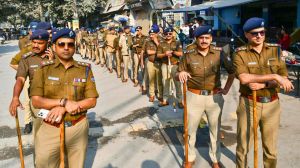G N Saibaba passes away: Friends remember him as a brilliant teacher and tireless activist
Saibaba, who taught English at Delhi University’s Ram Lal Anand College, spent a decade in jail over allegations of Maoist links. He was acquitted by the Nagpur Bench of Bombay High Court on March 5 this year.
 Former Delhi University (DU) professor Dr G N Saibaba
Former Delhi University (DU) professor Dr G N SaibabaFRIENDS AND colleagues remembered G N Saibaba, a former assistant professor at Delhi University, as a brilliant teacher, tireless human rights activist and a man who fought his battles with courage and an enduring smile.
Saibaba, who taught English at Delhi University’s Ram Lal Anand College, spent a decade in jail over allegations of Maoist links. He was acquitted by the Nagpur Bench of Bombay High Court on March 5 this year.
Nandita Narain, a former DU professor and a family friend, recalled meeting Saibaba in the early 2000s. “He didn’t have a wheelchair then, and I remember him crawling his way to my residence at St Stephen’s College. He wasn’t employed at the time, but his dedication and passion for teaching were clear,” she said.
“Despite his disability, he would commute from South Campus to North Campus to teach MA classes. Throughout his career at DU, he was actively involved in campaigning for policy changes, education rights and human rights for the voiceless,” Narain said. She recalled the time when, after Saibaba was terminated from his position, she and his wife Vasantha went to the Vice-Chancellor’s office to fight for his reinstatement and the DU Teachers’ Association issuing a strong statement in his defence.
Sharing her grief, Nandini Sundar, a professor at Delhi School of Economics, said: “The last time I met him was at an event for academic freedom. He told me something heartbreaking — that police had raided his home and destroyed his entire life’s research. It’s unimaginable… His death is a huge loss… to all those who cannot raise their voices for themselves,” she said.
Hem Mishra, a former JNU student who was Saibaba’s cellmate, called his death a “systematic murder”. Reflecting on their time in prison together, Mishra recalled how Saibaba, who required constant help due to his severe disability, never lost hope. “He was a brave man — he never stopped believing that justice would be served,” Mishra said. Life in prison was gruelling, Mishra recounted, with medical care delayed and many requests ignored. Despite his deteriorating health, Saibaba never gave up the fight, he said.







